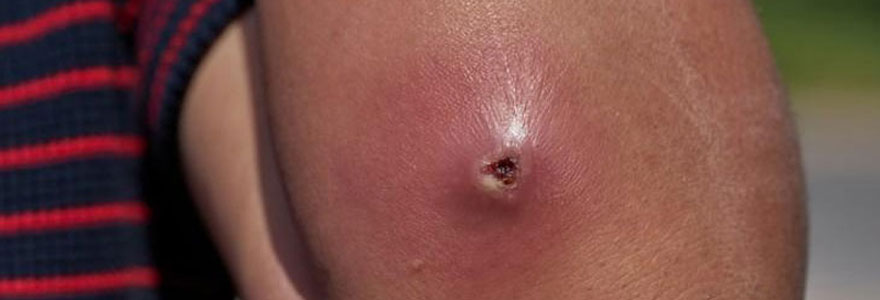
Dr. Amrita Khatri
M.D., B.H.M.S.Book Appointment
Abscess (Boils)

An abscess, often referred to colloquially as a boil, is a localized collection of pus that results from the body's response to infection or inflammation. Abscesses can occur in any part of the body. It is usually of the size of pimples but can be large and penetrate deep into the skin. It is typically painful, swollen, and filled with a thick, yellowish fluid composed of dead white blood cells, bacteria, and tissue debris. Abscesses can be seen most commonly on the chest, back, buttocks, face and lower abdomen. Skin abscesses can also appear in areas involving hair follicles like underarms and groin.
Symptoms
- Redness: The skin around the abscess often turns red and is warm to the touch.
- Swelling: The area becomes swollen and may continue to grow in size.
- Pain: Abscesses are typically painful, especially when touched or if pressure is applied.
- Pus Formation: As the abscess matures, it becomes filled with pus, a thick fluid containing dead tissue, bacteria, and white blood cells.
- Fever: In some cases, the infection can cause a fever and a general feeling of malaise.
- Tenderness: The area may be tender, and the pain can worsen as the abscess grows.
Causes
Abscesses are usually caused by bacterial infections, most commonly by
Staphylococcus aureus. Some of the parasites can also lead to the formation of
abscess but is very rare. The bacteria can enter the body through small cuts, hair
follicles, or even sweat glands, leading to an infection that the body tries to fight off by
sending white blood cells to the affected area. This response results in the
accumulation of pus, leading to the formation of an abscess. Usually people suffering
from faulty immune systems can have a tendency to develop frequent and resistant
abscess.
Common Causes Include:
- Infections: Bacteria such as Staphylococcus aureus are the primary cause.
- Injury or Trauma: Cuts, scrapes, or other breaks in the skin can allow bacteria to enter and cause an infection.
- Blocked Glands: Sweat or sebaceous glands can become blocked, leading to an infection and abscess formation.
- Weakened Immune System: Conditions that weaken the immune system, such as diabetes, HIV/AIDS, or chemotherapy, can increase the risk of developing abscesses.
- Poor Hygiene: Lack of proper hygiene can increase the likelihood of skin infections.
Diagnosis:
Diagnosis of abscess is usually done by the visual appearance of how it looks. Sometimes Ultrasonography (USG) is required to confirm the diagnosis. Rarely a Computed Tomography (CT) may be required if the infection is deeper.
Homeopathic treatment:
Homeopathy helps in developing the faulty immune mechanism which is a precursor for development of boils. It breaks the tendency for frequent abscess and also helps in cases of boils not responding to antibiotics.
Commonly prescribed Homeopathic medicines for abscesses are:
- Anthracinum: This medicine is especially suited to people having recurrent complaints of boils. There is intolerable burning pains and foul smell from the secretions. Bleeding if present is black, thick and tar like.
- Calcarea Sulphurica: This medicine is indicated when there is yellowish, thick, lumpy discharge from the abscess. The people requiring this medicine will have poor wound healing properties.
- Hepar Sulphurica: Abscesses which are formed are very sensitive to slightest touch. Skin is unhealthy and cracks on hands and feet are found. There is burning and stinging. These people are sensitive to cold.
- Silicea: There is painless swelling of glands. This medicine promotes expulsion of foreign bodies from tissues. Pus is very offensive.


